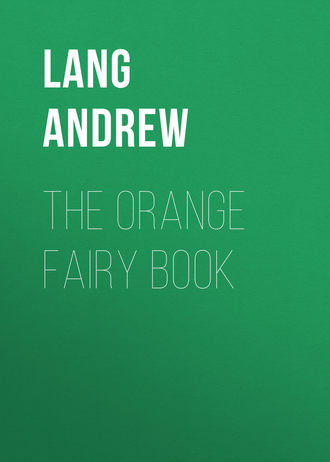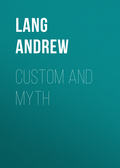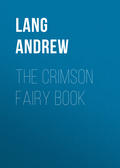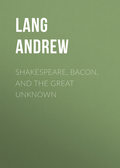
Lang Andrew
The Orange Fairy Book
Long he waited, but wait as he might, the basket never came back, for in their joy at being free the knight’s daughters had forgotten all about Ian, and had set sail in the ship that had brought him and his brothers to the land of Grianaig.
At last he began to understand what had happened to him, and while he was taking counsel with himself what had best be done, the raven came to him.
‘You did not heed my words,’ he said gravely.
‘No, I did not, and therefore am I here,’ answered Ian, bowing his head.
‘The past cannot be undone,’ went on the raven. ‘He that will not take counsel will take combat. This night, you will sleep in the giant’s castle. And now you shall give me a piece of tobacco.’
‘I will. But, I pray you, stay in the castle with me.’
‘That I may not do, but on the morrow I will come.’
And on the morrow he did, and he bade Ian go to the giant’s stable where stood a horse to whom it mattered nothing if she journeyed over land or sea.
‘But be careful,’ he added, ‘how you enter the stable, for the door swings without ceasing to and fro, and if it touches you, it will cause you to cry out. I will go first and show you the way.’
‘Go,’ said Ian. And the raven gave a bob and a hop, and thought he was quite safe, but the door slammed on a feather of his tail, and he screamed loudly.
Then Ian took a run backwards, and a run forwards, and made a spring; but the door caught one of his feet, and he fell fainting on the stable floor. Quickly the raven pounced on him, and picked him up in his beak and claws, and carried him back to the castle, where he laid ointments on his foot till it was as well as ever it was.
‘Now come out to walk,’ said the raven, ‘but take heed that you wonder not at aught you may behold; neither shall you touch anything. And, first, give me a piece of tobacco.’
Many strange things did Ian behold in that island, more than he had thought for. In a glen lay three heroes stretched on their backs, done to death by three spears that still stuck in their breasts. But he kept his counsel and spake nothing, only he pulled out the spears, and the men sat up and said:
‘You are Ian the soldier’s son, and a spell is laid upon you to travel in our company, to the cave of the black fisherman.’
So together they went till they reached the cave, and one of the men entered, to see what should be found there. And he beheld a hag, horrible to look upon, seated on a rock, and before he could speak, she struck him with her club, and changed him into a stone; and in like manner she dealt with the other three. At the last Ian entered.
‘These men are under spells,’ said the witch, ‘and alive they can never be till you have anointed them with the water which you must fetch from the island of Big Women. See that you do not tarry.’ And Ian turned away with a sinking heart, for he would fain have followed the youngest daughter of the knight of Grianaig.
‘You did not obey my counsel,’ said the raven, hopping towards him, ‘and so trouble has come upon you. But sleep now, and to-morrow you shall mount the horse which is in the giant’s stable, that can gallop over sea and land. When you reach the island of Big Women, sixteen boys will come to meet you, and will offer the horse food, and wish to take her saddle and bridle from her. But see that they touch her not, and give her food yourself, and yourself lead her into the stable, and shut the door. And be sure that for every turn of the lock given by the sixteen stable lads you give one. And now you shall break me off a piece of tobacco.’
The next morning Ian arose, and led the horse from the stable, without the door hurting him, and he rode across the sea to the island of the Big Women, where the sixteen stable lads met him, and each one offered to take his horse, and to feed her, and to put her into the stable. But Ian only answered:
‘I myself will put her in and will see to her.’ And thus he did. And while he was rubbing her sides the horse said to him:
‘Every kind of drink will they offer you, but see you take none, save whey and water only.’ And so it fell out; and when the sixteen stable-boys saw that he would drink nothing, they drank it all themselves, and one by one lay stretched around the board.
Then Ian felt pleased in his heart that he had withstood their fair words, and he forgot the counsel that the horse had likewise given him saying:
‘Beware lest you fall asleep, and let slip the chance of getting home again’; for while the lads were sleeping sweet music reached his ears, and he slept also.
When this came to pass the steed broke through the stable door, and kicked him and woke him roughly.
‘You did not heed my counsel,’ said she; ‘and who knows if it is not too late to win over the sea? But first take that sword which hangs on the wall, and cut off the heads of the sixteen grooms.’
Filled with shame at being once more proved heedless, Ian arose and did as the horse bade him. Then he ran to the well and poured some of the water into a leather bottle, and jumping on the horse’s back rode over the sea to the island where the raven was waiting for him.
‘Lead the horse into the stable,’ said the raven, ‘and lie down yourself to sleep, for to-morrow you must make the heroes to live again, and must slay the hag. And have a care not to be so foolish to-morrow as you were to-day.’
‘Stay with me for company,’ begged Ian; but the raven shook his head, and flew away.
In the morning Ian awoke, and hastened to the cave where the old hag was sitting, and he struck her dead as she was, before she could cast spells on him. Next he sprinkled the water over the heroes, who came to life again, and together they all journeyed to the other side of the island, and there the raven met them.
‘At last you have followed the counsel that was given you,’ said the raven; ‘and now, having learned wisdom, you may go home again to Grianaig. There you will find that the knight’s two eldest daughters are to be wedded this day to your two brothers, and the youngest to the chief of the men at the rock. But her gold cap you shall give to me and, if you want it, you have only to think of me and I will bring it to you. And one more warning I give you. If anyone asks you whence you came, answer that you have come from behind you; and if anyone asks you whither you are going, say that you are going before you.’
So Ian mounted the horse and set her face to the sea and her back to the shore, and she was off, away and away till she reached the church of Grianaig, and there, in a field of grass, beside a well of water, he leaped down from his saddle.
‘Now,’ the horse said to him, ‘draw your sword and cut off my head.’ But Ian answered:
‘Poor thanks would that be for all the help I have had from you.’
‘It is the only way that I can free myself from the spells that were laid by the giants on me and the raven; for I was a girl and he was a youth wooing me! So have no fears, but do as I have said.’
Then Ian drew his sword as she bade him, and cut off her head, and went on his way without looking backwards. As he walked he saw a woman standing at her house door. She asked him whence he had come, and he answered as the raven had told him, that he came from behind. Next she inquired whither he was going, and this time he made reply that he was going on before him, but that he was thirsty and would like a drink.
‘You are an impudent fellow,’ said the woman; ‘but you shall have a drink.’ And she gave him some milk, which was all she had till her husband came home.
‘Where is your husband?’ asked Ian, and the woman answered him:
‘He is at the knight’s castle trying to fashion gold and silver into a cap for the youngest daughter, like unto the caps that her sisters wear, such as are not to be found in all this land. But, see, he is returning; and now we shall hear how he has sped.’
At that the man entered the gate, and beholding a strange youth, he said to him: ‘What is your trade, boy?’
‘I am a smith,’ replied Ian. And the man answered:
‘Good luck has befallen me, then, for you can help me to make a cap for the knight’s daughter.’
‘You cannot make that cap, and you know it,’ said Ian.
‘Well, I must try,’ replied the man, ‘or I shall be hanged on a tree; so it were a good deed to help me.’
‘I will help you if I can,’ said Ian; ‘but keep the gold and silver for yourself, and lock me into the smithy to-night, and I will work my spells.’ So the man, wondering to himself, locked him in.
As soon as the key was turned in the lock Ian wished for the raven, and the raven came to him, carrying the cap in his mouth.
‘Now take my head off,’ said the raven. But Ian answered:
‘Poor thanks were that for all the help you have given me.’
‘It is the only thanks you can give me,’ said the raven, ‘for I was a youth like yourself before spells were laid on me.’
Then Ian drew his sword and cut off the head of the raven, and shut his eyes so that he might see nothing. After that he lay down and slept till morning dawned, and the man came and unlocked the door and shook the sleeper.
‘Here is the cap,’ said Ian drowsily, drawing it from under his pillow. And he fell asleep again directly.
The sun was high in the heavens when he woke again, and this time he beheld a tall, brown-haired youth standing by him.
‘I am the raven,’ said the youth, ‘and the spells are broken. But now get up and come with me.’
Then they two went together to the place where Ian had left the dead horse; but no horse was there now, only a beautiful maiden.
‘I am the horse,’ she said, ‘and the spells are broken’; and she and the youth went away together.
In the meantime the smith had carried the cap to the castle, and bade a servant belonging to the knight’s youngest daughter bear it to her mistress. But when the girl’s eyes fell on it, she cried out:
‘He speaks false; and if he does not bring me the man who really made the cap I will hang him on the tree beside my window.’
The servant was filled with fear at her words, and hastened and told the smith, who ran as fast as he could to seek for Ian. And when he found him and brought him into the castle, the girl was first struck dumb with joy; then she declared that she would marry nobody else. At this some one fetched to her the knight of Grianaig, and when Ian had told his tale, he vowed that the maiden was right, and that his elder daughters should never wed with men who had not only taken glory to themselves which did not belong to them, but had left the real doer of the deeds to his fate.
And the wedding guests said that the knight had spoken well; and the two elder brothers were fain to leave the country, for no one would converse with them.
The Fox and the Wolf
[From Tales of the West Highlands.]
At the foot of some high mountains there was, once upon a time, a small village, and a little way off two roads met, one of them going to the east and the other to the west. The villagers were quiet, hard-working folk, who toiled in the fields all day, and in the evening set out for home when the bell began to ring in the little church. In the summer mornings they led out their flocks to pasture, and were happy and contented from sunrise to sunset.
One summer night, when a round full moon shone down upon the white road, a great wolf came trotting round the corner.
‘I positively must get a good meal before I go back to my den,’ he said to himself; ‘it is nearly a week since I have tasted anything but scraps, though perhaps no one would think it to look at my figure! Of course there are plenty of rabbits and hares in the mountains; but indeed one needs to be a greyhound to catch them, and I am not so young as I was! If I could only dine off that fox I saw a fortnight ago, curled up into a delicious hairy ball, I should ask nothing better; I would have eaten her then, but unluckily her husband was lying beside her, and one knows that foxes, great and small, run like the wind. Really it seems as if there was not a living creature left for me to prey upon but a wolf, and, as the proverb says: “One wolf does not bite another.” However, let us see what this village can produce. I am as hungry as a schoolmaster.’
Now, while these thoughts were running through the mind of the wolf, the very fox he had been thinking of was galloping along the other road.
‘The whole of this day I have listened to those village hens clucking till I could bear it no longer,’ murmured she as she bounded along, hardly seeming to touch the ground. ‘When you are fond of fowls and eggs it is the sweetest of all music. As sure as there is a sun in heaven I will have some of them this night, for I have grown so thin that my very bones rattle, and my poor babies are crying for food.’ And as she spoke she reached a little plot of grass, where the two roads joined, and flung herself under a tree to take a little rest, and to settle her plans. At this moment the wolf came up.
At the sight of the fox lying within his grasp his mouth began to water, but his joy was somewhat checked when he noticed how thin she was. The fox’s quick ears heard the sound of his paws, though they were soft as velvet, and turning her head she said politely:
‘Is that you, neighbour? What a strange place to meet in! I hope you are quite well?’
‘Quite well as regards my health,’ answered the wolf, whose eye glistened greedily, ‘at least, as well as one can be when one is very hungry. But what is the matter with you? A fortnight ago you were as plump as heart could wish!’
‘I have been ill – very ill,’ replied the fox, ‘and what you say is quite true. A worm is fat in comparison with me.’
‘He is. Still, you are good enough for me; for “to the hungry no bread is hard.”’
‘Oh, you are always joking! I’m sure you are not half as hungry as I!’
‘That we shall soon see,’ cried the wolf, opening his huge mouth and crouching for a spring.
‘What are you doing?’ exclaimed the fox, stepping backwards.
‘What am I doing? What I am going to do is to make my supper off you, in less time than a cock takes to crow.’
‘Well, I suppose you must have your joke,’ answered the fox lightly, but never removing her eye from the wolf, who replied with a snarl which showed all his teeth:
‘I don’t want to joke, but to eat!’
‘But surely a person of your talents must perceive that you might eat me to the very last morsel and never know that you had swallowed anything at all!’
‘In this world the cleverest people are always the hungriest,’ replied the wolf.
‘Ah! how true that is; but – ’
‘I can’t stop to listen to your “buts” and “yets,”’ broke in the wolf rudely; ‘let us get to the point, and the point is that I want to eat you and not talk to you.’
‘Have you no pity for a poor mother?’ asked the fox, putting her tail to her eyes, but peeping slily out of them all the same.
‘I am dying of hunger,’ answered the wolf, doggedly; ‘and you know,’ he added with a grin, ‘that charity begins at home.’
‘Quite so,’ replied the fox; ‘it would be unreasonable of me to object to your satisfying your appetite at my expense. But if the fox resigns herself to the sacrifice, the mother offers you one last request.’
‘Then be quick and don’t waste my time, for I can’t wait much longer. What is it you want?’
‘You must know,’ said the fox, ‘that in this village there is a rich man who makes in the summer enough cheeses to last him for the whole year, and keeps them in an old well, now dry, in his courtyard. By the well hang two buckets on a pole that were used, in former days, to draw up water. For many nights I have crept down to the palace, and have lowered myself in the bucket, bringing home with me enough cheese to feed the children. All I beg of you is to come with me, and, instead of hunting chickens and such things, I will make a good meal off cheese before I die.’
‘But the cheeses may be all finished by now?’
‘If you were only to see the quantities of them!’ laughed the fox. ‘And even if they were finished, there would always be ME to eat.’
‘Well, I will come. Lead the way, but I warn you that if you try to escape or play any tricks you are reckoning without your host – that is to say, without my legs, which are as long as yours!’
All was silent in the village, and not a light was to be seen but that of the moon, which shone bright and clear in the sky. The wolf and the fox crept softly along, when suddenly they stopped and looked at each other; a savoury smell of frying bacon reached their noses, and reached the noses of the sleeping dogs, who began to bark greedily.
‘Is it safe to go on, think you?’ asked the wolf in a whisper. And the fox shook her head.
‘Not while the dogs are barking,’ said she; ‘someone might come out to see if anything was the matter.’ And she signed to the wolf to curl himself up in the shadow beside her.
In about half an hour the dogs grew tired of barking, or perhaps the bacon was eaten up and there was no smell to excite them. Then the wolf and the fox jumped up, and hastened to the foot of the wall.
‘I am lighter than he is,’ thought the fox to herself, ‘and perhaps if I make haste I can get a start, and jump over the wall on the other side before he manages to spring over this one.’ And she quickened her pace. But if the wolf could not run he could jump, and with one bound he was beside his companion.
‘What were you going to do, comrade?’
‘Oh, nothing,’ replied the fox, much vexed at the failure of her plan.
‘I think if I were to take a bit out of your haunch you would jump better,’ said the wolf, giving a snap at her as he spoke. The fox drew back uneasily.
‘Be careful, or I shall scream,’ she snarled. And the wolf, understanding all that might happen if the fox carried out her threat, gave a signal to his companion to leap on the wall, where he immediately followed her.
Once on the top they crouched down and looked about them. Not a creature was to be seen in the courtyard, and in the furthest corner from the house stood the well, with its two buckets suspended from a pole, just as the fox had described it. The two thieves dragged themselves noiselessly along the wall till they were opposite the well, and by stretching out her neck as far as it would go the fox was able to make out that there was only very little water in the bottom, but just enough to reflect the moon, big, and round and yellow.
‘How lucky!’ cried she to the wolf. ‘There is a huge cheese about the size of a mill wheel. Look! look! did you ever see anything so beautiful!’
‘Never!’ answered the wolf, peering over in his turn, his eyes glistening greedily, for he imagined that the moon’s reflection in the water was really a cheese.
‘And now, unbeliever, what have you to say?’ and the fox laughed gently.
‘That you are a woman – I mean a fox – of your word,’ replied the wolf.
‘Well, then, go down in that bucket and eat your fill,’ said the fox.
‘Oh, is that your game?’ asked the wolf, with a grin. ‘No! no! The person who goes down in the bucket will be you! And if you don’t go down your head will go without you!’
‘Of course I will go down, with the greatest pleasure,’ answered the fox, who had expected the wolf’s reply.
‘And be sure you don’t eat all the cheese, or it will be the worse for you,’ continued the wolf. But the fox looked up at him with tears in her eyes.
‘Farewell, suspicious one!’ she said sadly. And climbed into the bucket.
In an instant she had reached the bottom of the well, and found that the water was not deep enough to cover her legs.
‘Why, it is larger and richer than I thought,’ cried she, turning towards the wolf, who was leaning over the wall of the well.
‘Then be quick and bring it up,’ commanded the wolf.
‘How can I, when it weighs more than I do?’ asked the fox.
‘If it is so heavy bring it in two bits, of course,’ said he.
‘But I have no knife,’ answered the fox. ‘You will have to come down yourself, and we will carry it up between us.’
‘And how am I to come down?’ inquired the wolf.
‘Oh, you are really very stupid! Get into the other bucket that is nearly over your head.’
The wolf looked up, and saw the bucket hanging there, and with some difficulty he climbed into it. As he weighed at least four times as much as the fox the bucket went down with a jerk, and the other bucket, in which the fox was seated, came to the surface.
As soon as he understood what was happening, the wolf began to speak like an angry wolf, but was a little comforted when he remembered that the cheese still remained to him.
‘But where is the cheese?’ he asked of the fox, who in her turn was leaning over the parapet watching his proceedings with a smile.
‘The cheese?’ answered the fox; ‘why I am taking it home to my babies, who are too young to get food for themselves.’
‘Ah, traitor!’ cried the wolf, howling with rage. But the fox was not there to hear this insult, for she had gone off to a neighbouring fowl-house, where she had noticed some fat young chickens the day before.
‘Perhaps I did treat him rather badly,’ she said to herself. ‘But it seems getting cloudy, and if there should be heavy rain the other bucket will fill and sink to the bottom, and his will go up – at least it may!’






